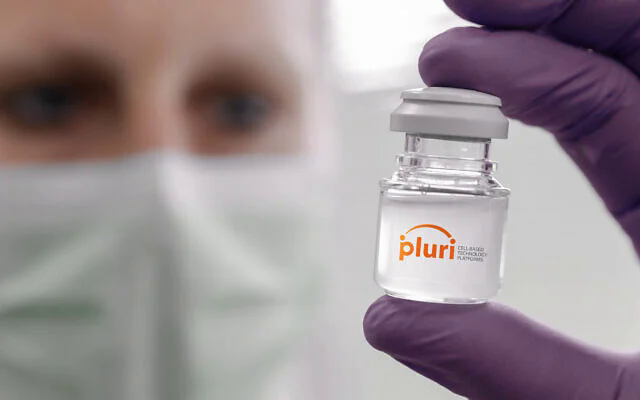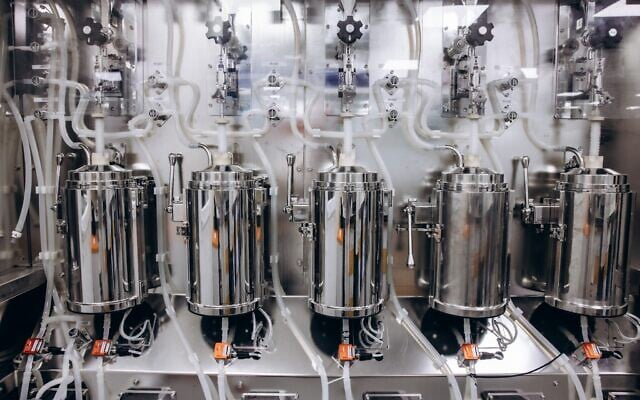
Haifa-based Pluri entered into an exclusive collaboration with Ukrainian umbilical cord blood bank Hemafund last month to stockpile and distribute its placental expanded cell therapy, PLX-R18, as a potential treatment for life-threatening radiation sickness. Under the terms of the collaboration agreement with Hemafund, Pluri will produce and supply an initial capacity of 12,000 doses of its PLX-R18, sufficient to treat 6,000 people. Pluri was founded in 2001 by Technion alumnus Shai Meretzki, who made use of a stem cell patent developed during his Ph.D. studies in the Rappaport Faculty of Medicine
Amid rising threat from Russia, Pluri partners with Ukrainian blood bank to stockpile remedy for deadly radiation poisoning that uses cells grown from donated placentas.
About two weeks after a Russian drone struck the cover built to contain radiation at the Chernobyl nuclear power plant, Israeli biotech firm Pluri, a developer of placenta-based cell technology, landed an agreement to help Ukraine develop an emergency response to life-threatening radiation sickness in case of a radiological event.
The nearly three-year war between Russia and Ukraine has underscored the ever-rising threat of nuclear fallout amid repeated shelling of a nuclear power plant in southern Ukraine and Russian President Vladimir Putin’s threat to use nuclear weapons.
Last month, Haifa-based Pluri (formerly Pluristem) entered into an exclusive collaboration with Ukrainian umbilical cord blood bank Hemafund to stockpile and distribute its placental expanded cell therapy, PLX-R18, as a potential treatment for life-threatening radiation sickness.
The condition, also known as hematopoietic acute radiation syndrome (H-ARS), occurs when a person is exposed to high levels of ionizing radiation, such as during a nuclear attack or accident. Destruction of the bone marrow and blood cells ensues, leading to severe anemia, infection and bleeding.
Death can occur in four to eight weeks if effective treatment is not received.
Over the past two decades, Pluri has focused on developing 3D technology to mimic how living cells communicate and interact with the body to grow and expand. The biotech firm harnesses stem cells extracted from placenta donated by healthy women who have given birth by cesarean section in hospitals around the country. The single placenta cells are cultivated in a proprietary 3D bioreactor system with a micro-environment that resembles and simulates the human body.
“Cells are the building blocks of life — everything in our world starts and ends with cells,” Pluri chief commercial officer Nimrod Bar Zvi told The Times of Israel. “These tiny cells are amazing creatures that exist in almost any aspect of our life, whether we get them from humans, animals, or plants.”
Bar Zvi explained that once placed inside bioreactors, the stem cells latch onto scaffolds and start “to communicate with each other and proliferate, similar to what happens in the human body, and they are secreting proteins as we mimic the conditions of the natural environment they need to expand.”
Using the 3D cell expansion technology method, a single placenta cell can be multiplied into billions of distinct cells, Pluri said. As a result, cells from a single placenta can treat more than 20,000 patients.
“In the end of that process, we have a vial that contains a specific amount of our placental expanded cells depending on the dosage needed for the patient,” said Bar Zvi. “Once the vial with the cells is injected into the muscle, it stimulates the human body’s own capabilities for the reactivation and regeneration of blood cells, mitigates the effects of radiation exposure and we see the recovery happening.”
Pluri says that its cell-based treatment stimulates and regenerates the production of all three types of blood cells produced in the blood marrow: white and red blood cells as well as platelets.
Under the terms of the collaboration agreement with Hemafund and subject to receiving external government and private sector funding, the veteran biotech firm will produce and supply an initial capacity of 12,000 doses of its PLX-R18, sufficient to treat 6,000 people. The doses will be stored and managed by Hemafund and delivered to medical institutions across Ukraine in case of need.
“At present, there are no other treatments for radiation poisoning that use stem cells taken from a placenta as far as we know,” said Bar Zvi. “The ability to treat acute radiation exposure with cell therapy and to scale it up for mass production is where we are unique since we can supply thousands and thousands of vials to large numbers of people.”
Pluri is publicly traded on the Nasdaq as well as the Tel Aviv Stock Exchange. At the Matam Advanced Technology Park in Haifa, the biotech firm operates a cell therapy production facility, which it says has been designed to handle large-scale manufacturing of cellular therapies. It could also be mobilized for mass production to respond to global emergencies if nuclear threats escalate. The firm employs a total of 130 people.
Pluri and Hemafund said they will also seek to advance clinical trials to register the PLX-R18 therapy as a radiation countermeasure and obtain necessary regulatory approvals from Ukraine’s health ministry. The collaboration is expected to potentially generate over $100 million in value for both parties.
“Our cryostorage facilities and logistics network position us well to support the introduction of PLX-R18 as a potential vital tool for radiation emergency preparedness in Ukraine,” said Hemafund founder Yaroslav Issakov. “While we hope such treatments remain precautionary, our goal is to stand ready to distribute this potential therapy in the event of an emergency.”

Pluri said that its PLX-R18 has been safely tested in both humans and animals. Results from a series of recent studies in animals of its stem cell therapy after radiation exposure demonstrated an increase in survival rates from 29% in the placebo group to 97% in the treated group.
The administration of PLX- R18 as a prophylactic measure 24 hours before radiation exposure, and again 72 hours after exposure, resulted in an increase in survival rates, from 4% in the placebo group to 74% in the treated group.
The FDA previously cleared an Investigational New Drug application for PLX-R18 for the treatment of radiation sickness and granted it Orphan Drug Designation. This means that should a nuclear event take place, Pluri could use the drug to treat victims.

In July 2023, Pluri was awarded a three-year $4.2 million contract by the US National Institutes of Health to continue to develop its novel treatment for deadly radiation sickness and to collaborate with the US Department of Defense’s Armed Forces Radiobiology Research Institute in Maryland.
As part of the contract, the NIH’s National Institute of Allergy and Infectious Diseases (NIAID) will fund final studies required to complete the biotech firm’s application for FDA approval to market its PLX-R18 therapy.
Pluri hopes that the approval would make it eligible for purchase by the US Strategic National Stockpile — the country’s repository of critical medical supplies — as a medical countermeasure for exposure to nuclear radiation.
